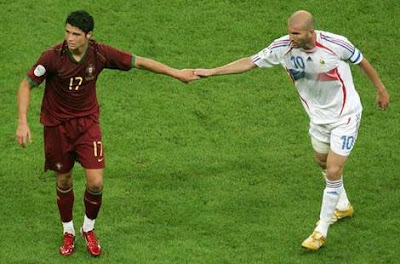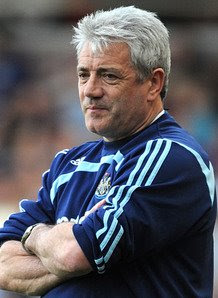
Lionel Messi admirer, Clark Whitney gives his take on why he thinks “The Messiah” will go from a young phenomenon to a world class footballing icon in the 2008/09 season....
It was a warm June afternoon in 2006. Having finished my classes for the day, I rushed to the nearest TV to tune in to the World Cup. Argentina were up against Serbia and Montenegro and the South American heavyweights were comfortably ahead 3-0. A foregone conclusion.
But there was good reason to keep watching. Shortly after tuning in, a substitution was made: Maxi Rodriguez was withdrawn for a young Lionel Messi, who was just six days shy of his 19th birthday.
Just four minutes into his entrance, the teenager was released down the left flank, creeping behind the defensive line. Having a nearly impossible angle wherefrom to shoot, he provided an inch-perfect pass across the face of goal. It evaded three defenders and the goalkeeper, but not Hernan Crespo, who tapped the ball into the net.
Then, in the 88th minute, Messi made a long run off the ball to receive a pass from Carlos Tevez just as he burst into the box. With just one defender to beat, Messi raced ahead and coolly knocked the ball past Dragoslav Jevric, capping a 6-0 rout. It was on this day that I became a Lionel Messi fan.
Lionel Messi’s talent is undeniable, although the extent of it is still heavily debated. Some hail him as the next Diego Maradona, while others think that he will never reach the heights of some of the great wide forwards, such as Maradona himself and, more recently, Cristiano Ronaldo. While I cannot compare Messi to the great Diego – I was just four years of age when Maradona left Napoli for Sevilla and entered the autumn of his career – I can compare Messi to Ronaldo.
I will be the first to admit that comparing players is generally a difficult and flawed process. After all, in spite of their having similar playing positions on the pitch, Messi and Ronaldo have different playing styles and talents.
Ronaldo is, marginally, the faster of the two, and is certainly stronger. He benefits greatly from the fast pace of the English game, as he is able to instantaneously transition from defence to lead a breakaway. However, he often wastes his strength and balance by falling when he could easily stay on his feet. As for his technical advantages, the Portuguese ace is far better in the air than Messi, and has a better shot. And yet, I have plenty of reason to believe that Argentine will emerge the better player at the end of this season.
To begin with, I doubt Ronaldo will be able to replicate last year’s success in the 2008-09 season. Missing the early stages of this season with injury has given him plenty of time to lose focus and brood over his failure to move to Real Madrid in the off-season. To add to this, he has received (and will continue to do so) every individual award imaginable for his performance last year. In addition, he also picked up winners’ medal for the Champions’ League and the Premiership with Manchester United. So, what else does he have to prove?
Plenty, if you ask me – he has never won anything with Portugal and his displays in important Premier League and Champions League matches have sometimes been far below his performance against low-level league teams. However, this knowledge will not weigh heavily on the mind of a self-assured, distracted, and discontented Ronaldo.
Messi, on the other hand, has everything to prove and, with Ronaldinho having left Barcelona, finally has his chance to do so. His dribbling is unmatched by anyone in the world and while he lacks Ronaldo’s flashiness, he is far more effective in one-on-one situations, and has the unique ability to take on several defenders at once. Moreover, his work rate exceeds that of Ronaldo’s by leaps and bounds.
The Argentine uses his diminutive stature to surprisingly good effect. Having a low centre of gravity, he is amazingly agile and has incredible balance. Unlike Ronaldo, Messi continues to play after contact with opposing defenders, using a combination of speed, balance, and ball control. Instead of trying to run behind a defensive line as Ronaldo does, the Argentine runs towards his opponents, cutting to the centre. In doing so, he puts himself in an ideal position for making plays. Instead of simply shooting (Ronaldo did manage 42 goals last year, but took 255 shots), the Barça winger creates openings and he does it with great efficiency.
While Ronaldo had only eight assists in 49 appearances, an injury-riddled Messi amassed 13 assists to complement his 16 goals in 38 appearances. He also initiated countless attacking moves that resulted in goals for his team but for which he was never credited with a direct assist.
Perhaps most importantly, Messi is a big-game player, whereas Ronaldo, as the argument goes, is not. Many are quick to hail the United ace for his 42 goals – a feat that is absolutely remarkable regardless of how they were scored – without considering the opponents against whom he scored. Ronaldo did indeed tally more strikes (eight) than any other in the Champions League, but, for example, he was surprisingly anonymous in both legs of the semi final against Barcelona, doing little more than missing an early penalty at the Camp Nou.
Against Chelsea, in perhaps the most important match of his life, the Portuguese again did little, but had a Gerd Mueller-like flash of brilliance and managed to score a great goal. Still, he could have cost his team the Champions’ League trophy with his missed penalty during the shoot-out if not for John Terry’s even less impressive effort moments later.
As for his outstanding total of 31 Premiership goals, 20 of them were scored against teams in the lower half of the table, and just three against the “big four”. Of course, the statistic of three goals in six matches is still very good, especially considering the fact that they were scored against top teams. However, we can’t say that Ronaldo truly led his team to any of their success last season. He helped very much, but in the important matches, he failed to perform to the best of his ability.
Messi, on the other hand, is a great leader and tends to play his best in important matches, although he still has much to prove. While Ronaldo failed to impress in either leg of the 2008 Champions League semifinals, the bullish Argentine was an omnipresent force at the Camp Nou and even put on a good showing at Old Trafford, although he could not save his team from a 1-0 defeat in the second leg.
Still, Messi has a record, albeit limited, of leadership and success. In 2005, he won the U-20 World Cup with Argentina, earning himself both the Golden Ball and Golden Boot awards. Last month, he led Argentina to the gold medal at the Olympics, providing a perfect assist to Angel Di Maria for the tournament winner. He also won the 2006 Champions League with Barcelona, although he only participated in 7 of the 13 matches during that competition. Ultimately, he still has much to prove for both club and country, which will provide plenty of motivation to the 21 year old.
Judging from his performances at the Olympics, it seems as though Messi is finally coming of age. That said, the young “Messiah” has plenty of room for growth and may not peak for another two to three, or even five years. And yet, barring injury, I still think he will win the 2009 Ballon D’Or.
Readmore »»

















